

NRC/GT—Spring '01 Newsletter-Suicide Among Gifted Adolescents: How to Prevent It. Thinking like a genius: overview. Thinking and recall series Problem solving: creative solutions "Even if you're not a genius, you can use the same strategies as Aristotle and Einstein to harness the power of your creative mind and better manage your future.
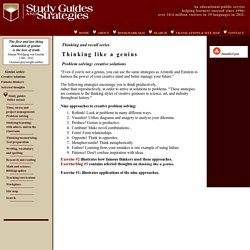
" The following strategies encourage you to think productively, rather than reproductively, in order to arrive at solutions to problems. "These strategies are common to the thinking styles of creative geniuses in science, art, and industry throughout history. " Nine approaches to creative problem solving: Rethink! Exercise #2 illustrates how famous thinkers used these approaches. Exercise #1: illustrates applications of the nine approaches. Text of exercise:Nine approaches to creative problem solving: Thinking like a genius: selected thoughts. Gender and Genius. Kerr, B.
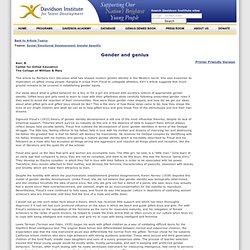
Center for Gifted Education The College of William & Mary This article by Barbara Kerr discusses what has shaped modern gender identity in the Western world. She also examines its implication on gifted young people. Ranging in scope from Freud to collegiate athletics, Kerr's article suggests that much ground remains to be covered in establishing gender equity. Our ideas about what is gifted behavior for a boy or for a girl are imbued with society's notions of appropriate gender identity. Sigmund Freud's (1933) theory of gender identity development is still one of the most influential theories, despite its lack of empirical support. Freud also gave us the idea that girls and women are incomplete men. Despite the hostility with which the psychoanalytic establishment greeted disagreement, Karen Horney (1939) disputed this model of gender identity development.
Therefore, a new stereotype of the gifted boy was born, of the well adjusted, athletic, popular guy. The intellectual and psychosocial nature of extreme giftedness. Powell, P.
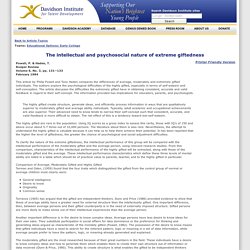
& Haden, T. Roeper Review Volume 6, No. 3, pp. 131--133 February 1984 This article by Philip Powell and Tony Haden compares the differences of average, moderately and extremely gifted individuals. The authors explore the psychological difficulties of the highly gifted, especially in terms of self-esteem and self-conception. The article discusses the difficulties the extremely gifted have in obtaining consistent, accurate and valid feedback in regard to their self-concept. The information provided has implications for educators, parents, and psychologists. The highly gifted create structure, generate ideas, and efficiently process information in ways that are qualitatively superior to moderately gifted and average ability individuals. The highly gifted are rare in the population. General intelligence Desire to know Originality Common sense. Intellectual Giftedness. Intellectual giftedness, often referred to as high IQ, is usually given short shrift when it comes to considerations of the special needs of exceptional people.
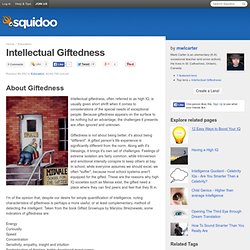
Because giftedness appears on the surface to be nothing but an advantage, the challenges it presents are often ignored and unknown. Giftedness is not about being better, it's about being *different*. A gifted person's life experience is significantly different from the norm. Intellectual Giftedness. Being Gifted. It’s painful.
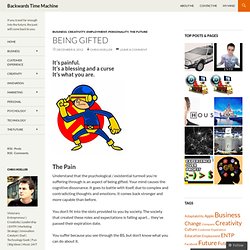
It’s a blessing and a curse It’s what you are. The Pain Understand that the psychological / existential turmoil you’re suffering through is an aspect of being gifted. Your mind causes the cognitive dissonance. It goes to battle with itself, due to complex and contradicting thoughts and emotions. Understanding Giftedness. Who are the Gifted?
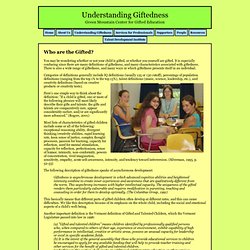
You may be wondering whether or not your child is gifted, or whether you yourself are gifted. It is especially confusing since there are many definitions of giftedness, and many characteristics associated with giftedness. There is also a wide range of giftedness, and many ways in which giftedness presents itself in an individual. Categories of definitions generally include IQ definitions (usually 125 or 130 cutoff), percentage of population definitions (ranging from the top 1% to the top 15%), talent definitions (music, science, leadership, etc. Exquisite Minds: Gifted and Creative Children « Support for Educators and Parents of Gifted and Creative Children "The problems that exist in the world today cannot be solved by the level of thinking that cr. Gifted adults. Creativity across the life-span: A systems view.
Csikszentmihalyi, M.
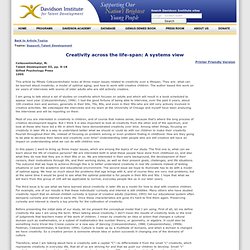
Talent Development III, pp. 9-18 Gifted Psychology Press 1995 This article by Mihaly Csikszentmihalyi looks at three major issues related to creativity over a lifespan. They are: what can be learned about creativity; a model of optimal aging; and how to work with creative children. The author based this work on six years of interviews with scores of older adults who are still actively creative. I am going to talk about a set of studies on creativity which focuses on adults and which will result in a book scheduled to appear next year (Csikszentmihalyi, 1996). Most of you are interested in creativity in children, and of course that makes sense, because that's where the long process of creative development begins.
In this paper, I want to bring up three major issues, which are among the topics of our study. Gender and Genius. The intellectual and psychosocial nature of extreme giftedness. No Thought Suppression. How pushing a thought out of consciousness can bring it back with a vengeance. It sometimes feels like our minds are not on the same team as us. I want to go to sleep, but it wants to keep me awake rerunning events from my childhood. I want to forget the lyrics from that stupid 80s pop song but it wants to repeat them over and over again ad nauseam. This internal battle can be anything from the attempt to suppress an occasional minor irritation (did I turn off the cooker?) The Nature Of Genius. Genius by L.
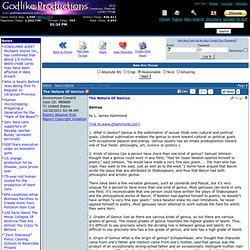
James Hammond. Unlocking the Mysteries of The Artistic Mind. Consider the flightless fluffs of brown otherwise known as herring gull chicks.
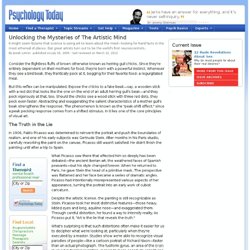
Since they're entirely dependent on their mothers for food, they're born with a powerful instinct. Whenever they see a bird beak, they frantically peck at it, begging for their favorite food: a regurgitated meal.